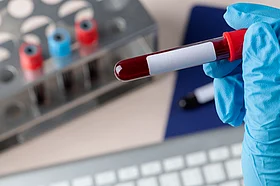Orissa High Court Directs State Government to Provide Detailed Response on NAT-PCR Testing Implementation
The Orissa High Court has directed the state government to provide a detailed response regarding the implementation of nucleic acid testing polymerase chain reaction (NAT-PCR) blood testing facilities in all blood banks. This directive came after a contempt petition was filed by advocate Prabir Kumar Das, who alleged that the government had failed to fulfill its commitment to establish these advanced testing facilities as promised.
The division bench, comprising Chief Justice Harish Tandon and Justice MS Raman, issued the order on Thursday. The court instructed the commissioner-cum-secretary of the Health and Family Welfare department to file an affidavit within two weeks. This document should outline the steps taken to meet the commitment made in court in November 2023. The case is scheduled for further hearing on August 4.
This development follows a contempt petition filed by Das on April 2, 2025. In his plea, Das argued that the state government had willfully ignored the high court’s order dated November 30, 2023. That order required the establishment of advanced NAT-PCR testing facilities in all 56 blood collection centers across the state by the end of March 2025.
The court’s order came in response to an earlier Public Interest Litigation (PIL) filed by Das, which highlighted the risks associated with traditional ELISA-based screening methods used in blood transfusions. He emphasized that NAT-PCR technology enables early detection of infections such as HIV 1 and 2, Hepatitis B, and Hepatitis C, thereby ensuring safer blood transfusions.
In its response to the PIL in November 2023, the Health department stated that 47% of the blood collected in Odisha was being tested using NAT-PCR technology at 11 centers. The government had assured the court that it would expand this facility to all 56 centers at an estimated cost of ₹200 crore by March 2025.
However, Das, who appeared in person, submitted that information obtained through Right to Information (RTI) queries from the Directorate of Blood Safety (March 3, 2025) and the Health department (March 17, 2025) confirmed that only the original 11 centers were equipped with NAT-PCR technology. No progress had been made in the remaining 45 centers.
Das described the inaction as a “deliberate and wilful violation” of the court’s order. He urged the bench to initiate proceedings under the Contempt of Courts Act against the commissioner-cum-secretary. While the court did not proceed with contempt proceedings, it directed the official to submit a status update within two weeks.
Key Points from the Case
- Contempt Petition: Filed by Prabir Kumar Das on April 2, 2025, alleging failure to implement NAT-PCR testing in all blood banks.
- Court Order: Directed the Health department to file an affidavit detailing steps taken to meet the commitment made in November 2023.
- NAT-PCR Technology: Offers early detection of critical infections, making blood transfusions safer.
- Government Assurances: Stated that 47% of blood was tested using NAT-PCR at 11 centers, with plans to expand to all 56 centers by March 2025.
- RTI Findings: Revealed that only 11 centers had the facility, with no progress on the remaining 45.
- Court Action: Did not initiate contempt proceedings but asked for a detailed status update within two weeks.
This case underscores the importance of transparency and accountability in public health initiatives, particularly those involving life-saving medical procedures like blood transfusions. The Orissa High Court’s directive highlights the judiciary’s role in ensuring that government commitments are fulfilled, especially when they impact public welfare.







